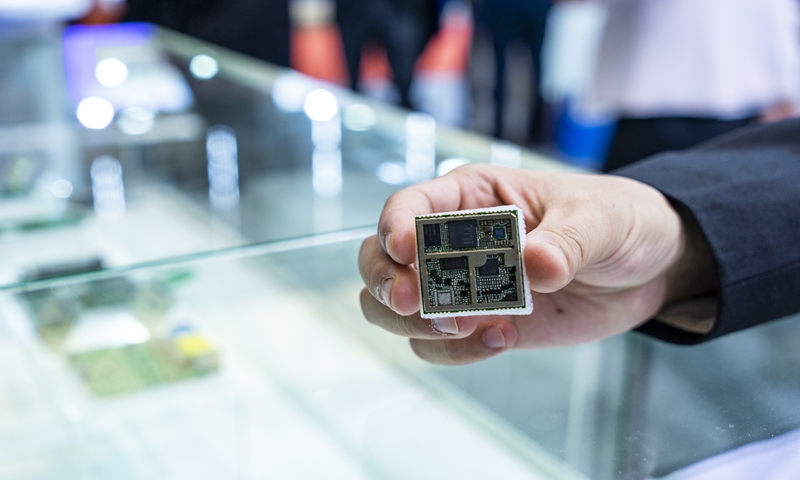Taiwan island’s semiconductor sector should not be hijacked by secessionists to damage China’s national unity: experts

An employee showcases a semiconductor integrated circuit at an industry expo. Photo: VCG
Taiwan island's semiconductor sector, though important and technological advanced, it is not irreplaceable, and that no industry should be hijacked to damage national unity, experts have stated.
According to a report by Bloomberg on Tuesday, the world is "dangerously dependent on Taiwan for semiconductors", as a shortage of auto chips has exposed crucial role of Taiwan Semiconductor Manufacturing Company (TSMC) during the COVID-19 pandemic.
The Bloomberg report said the greater worry is that TSMC's chip factories could become collateral damage if the Chinese mainland were to make good on threats to "invade" the island of Taiwan if it moves toward independence.
The island of Taiwan is an inalienable part of China. The importance of the sector cannot overshadow national unity, and no one can hijack the sector for the secession of the Taiwan island, said Li Baiyang, a postdoctoral fellow at the Information Resources Research Center of Wuhan University.
"The Taiwan secessionists seeking to hold back Taiwan's semiconductor industry is pure wishful thinking,"Liu Guoshen, dean of the Taiwan Research Institute of Xiamen University told the Global Times.
Liu said that Taiwan's chip industry and national unity are two issues of completely different levels, and should not be confused in any way. "No matter how important an industry is, it cannot be used by any party to endanger national unity."
According to the Bloomberg report, Taiwan now represents the "choke point" of the global semiconductor industry, with the ASE Technology Holding as the world's top chip assembler, and MediaTek as the largest smartphone chipset vendor.
Li told the Global Times that while the Taiwan's semiconductor sector is important, its role has been recognized for years, instead of only from the shortages during COVID-19.
"Every time there is a natural disaster in the Taiwan island, the global technology industry will immediately look out for any sign of fluctuation," Li said.
The island's exports to the mainland accounted for up to 43.8 percent of the year of 2020, most of which was still electronic components, an increase of about 20 percent, reaching $20.76 billion.
According to Liu, the rapid development of Taiwan's chip industry is the result of many factors, including the efforts of Taiwan's companies and the international industrial structure. The market and resources in the mainland also give Taiwan's chip foundry companies the opportunity to obtain unique development opportunities.
"The Democratic Progressive Party (DPP) has no right to be complacent." Li told the Global Times, adding that Taiwan's semiconductor industry was a product of the Kuomintang era and the result of the US capital layout those years. He noted that the biggest hidden danger of Taiwan's industrial structure is in fact the DPP.
"The DPP likes to politicize any issue and do not follow the laws of economic development and technological development," Liu said.
Major world economies are also wary of over dependence on the Taiwan semiconductor industry. According to the Bloomberg report, Germany and France realized the possibility of chip shortages last year, and both agreed that Europe needs to accelerate the development of its own chip industry. Dozens of European countries have spent 30 billion euros to maintain "technical sovereignty" to increase Europe's share of the global chip market from less than 10 percent to 20 percent.
When the global semiconductor industry is restructured, Taiwan will lose its technological advantages, according to Li.
"At that time, if the DPP still cannot set its priorities clear, there will be a massive outflow of talents from Taiwan's semiconductor companies. Then this is the beginning of the decline of Taiwan's semiconductor industry," Li said.
